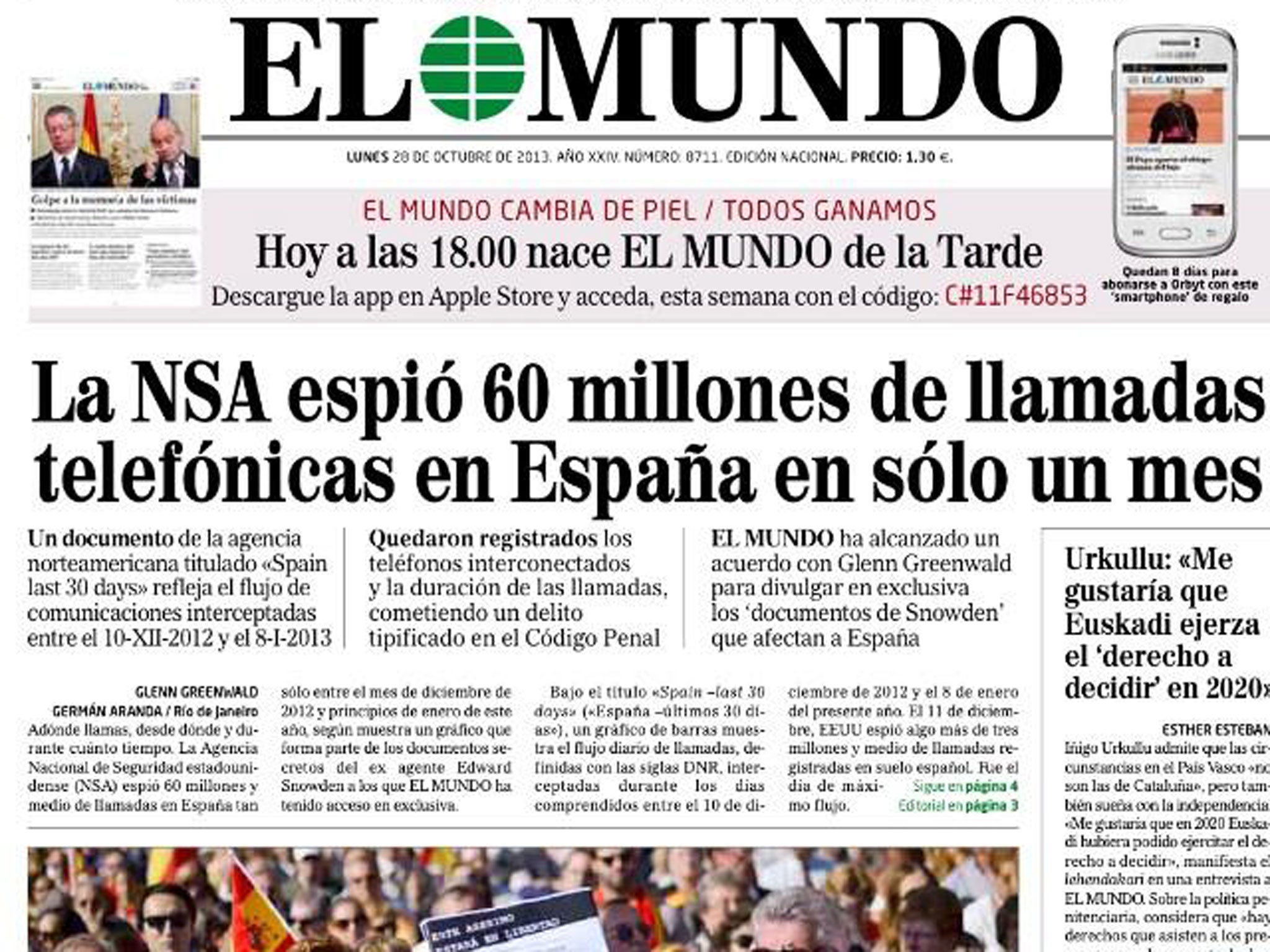NSA 'tapped 60m Spanish phone calls' as country joins France and Germany in outrage over latest Snowden revelations
US ambassador to Spain, already summoned following early reports on Friday, to be quizzed by the foreign ministry

Your support helps us to tell the story
From reproductive rights to climate change to Big Tech, The Independent is on the ground when the story is developing. Whether it's investigating the financials of Elon Musk's pro-Trump PAC or producing our latest documentary, 'The A Word', which shines a light on the American women fighting for reproductive rights, we know how important it is to parse out the facts from the messaging.
At such a critical moment in US history, we need reporters on the ground. Your donation allows us to keep sending journalists to speak to both sides of the story.
The Independent is trusted by Americans across the entire political spectrum. And unlike many other quality news outlets, we choose not to lock Americans out of our reporting and analysis with paywalls. We believe quality journalism should be available to everyone, paid for by those who can afford it.
Your support makes all the difference.Spain has become the latest European ally of the United States to express outrage at Washington’s clandestine operations after it emerged that the American National Security Agency (NSA) had monitored tens of millions of Spanish phone calls in the space of a single month.
El Mundo newspaper reported that a leaked NSA document showed the American agency had tracked 60 million phone calls, texts and emails in Spain between 10 December 2012 and 8 January this year. The White House has yet to comment. The US’s ambassador to Madrid, James Costos, was summoned to a meeting with the Secretary of State for the European Union, Inigo Méndez de Vigo, on Monday morning by Prime Minister Mariano Rajoy.
A statement from Spain’s foreign ministry said that the alleged eavesdropping – “if true” – was “inappropriate and unacceptable”. The practices are also, as El Mundo pointed out in an editorial on Monday, illegal in Spain, with unauthorised “violation of the privacy of millions of Spaniards punishable by up to four years in prison”.
The meeting concluded with Mr Costos leaving with a security escort and making no comments to journalists assembled outside, nor, indeed, to a lone, placard-wielding, protester. El Mundo said its report and a classified graph, entitled “Spain – last 30 days”, of the US’s alleged monitoring were based on documents provided by Brazil-based journalist Glenn Greenwald. Mr Greenwald, co-writer of El Mundo’s report, in turn had received the documents from the ex-NSA contractor and whistleblower Edward Snowdon. Although actual conversations were not apparently taped, the newspaper claimed the duration and location of the origin and destination of tens of millions calls were recorded, with a peak of 3.5 million calls tracked in a single day on 11 December.
If confirmed, the report will have opened a new chapter of the spying scandals that have seen similar stories emerging from France and Germany – which also summoned respective US ambassadors to meetings to discuss the allegations.
The stories have also led to calls from Germany that the EU’s 28-member states reach a “no-spy” deal, following reports that the NSA had monitored Chancellor Angela Merkel’s mobile phone. Among the mounting diplomatic tension, it would also indirectly increase the pressure on Spain to accept Germany’s proposal, which Spain had previously rejected.
Spain’s media later reported that the country’s Foreign Minister, José Manuel García-Margallo – in Poland on an official visit – said that “if confirmed” the US monitoring could lead to a “breakdown in the climate of trust” between Washington and Madrid.
Join our commenting forum
Join thought-provoking conversations, follow other Independent readers and see their replies
Comments